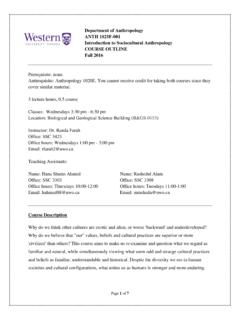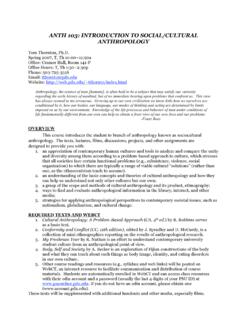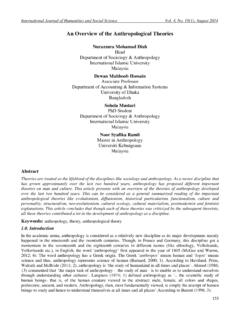Transcription of UNIVERSITY OF CALIFORNIA, MERCED ANTH 1 …
1 UNIVERSITY OF CALIFORNIA, MERCED ANTH 1 introduction to socio - cultural anthropology (Summer 2015) Classroom and Office Building (COB) 110 Monday Wednesday Friday 10:00am 12:20pm Instructor: Michael Eissinger Office: SSM 274 email: phone: 559-240-8117 (text or leave a message) website: www. Office Hours: by appointment I. Course Description: anthropology at UC MERCED emphasizes three sub-fields: archaeological, biological, and socio - cultural anthropology . socio - cultural anthropology involves the study of contemporary human experiences around the globe and the ways in which people adapt to, make sense of, and transform their worlds.
2 It merges American cultural anthropology , which historically emphasized the study of belief and value systems, language, and other practices and expressions of meaning; with British social anthropology , which historically emphasized social structures and institutions including kinship, economic, and political systems in both small and large-scale societies. socio - cultural anthropology strives to understand the complexities of societies by comparing differences, similarities, and the dynamics that link people across time and space. This course is an introduction to socio - cultural anthropology .
3 We will learn the key concepts and frameworks that guide anthropological inquiry. In addition, we will read a book about doing ethnography: a classic reflection on the interpersonal dimensions of conducting fieldwork (in Morocco) and two ethnographies (anthropological case studies). You will select the first ethnography from the list at the end of this syllabus and we will all read one about globalization as seen through the circulation of Hello Kitty. These and other readings will illustrate the diversity of themes explored through contemporary socio - cultural anthropology .
4 We will also highlight links to the subfields of archaeological and biological anthropology as taught at UC MERCED . II. Course Goals and Outcomes: Course Goals: Trace the key individuals who contributed to the historical foundations of socio - cultural anthropology . Learn key concepts and major topics through which anthropologists study and compare similarities and differences in human societies. Understand the fundamentals of the ethnographic method of conducting fieldwork, ethnography as a scholarly product of anthropological fieldwork, and the code of ethics that guides the profession.
5 Understand the perspective that socio - cultural anthropology provides on the human experience and how this can connect with the goals and methods of other sub-fields of anthropology . Be able to communicate knowledge gained about socio - cultural anthropology . 2 Learning Outcomes: By the end of this course through in-class discussions, interactions, and written papers, and exams students will demonstrate: 1. Possession of and ability to apply fundamental knowledge about socio - cultural anthropology including historical foundations, terminology, key concepts, fieldwork methods, and topics of study.
6 2. Knowledge of topics in socio - cultural anthropology that are shared by the sub-fields of anthropology and that enable the comparison of similarities and differences among human societies across time and/or space. 3. Why and how ethics applies to the practice of socio - cultural anthropology and to our role as citizens. 4. Ability to analyze ethnographies (anthropological case studies) and to make connections between the socio - cultural worlds of others and their own world. 5. Knowledge of the ways that qualitative and quantitative research methods are applied in specific socio - cultural anthropology case studies.
7 6. Possession of effective communication skills, including writing, oral presentation in various formats. III. Format and Procedures: This course is structured as follows: two interactive lecture sessions (Monday and Wednesday) and one weekly discussion section (Friday). There will be times when lecture will continue into Friday, however, almost all discussions will take place on the assigned readings during the Friday session IV. Course Requirements and Grading Procedures: Required texts: Social and cultural anthropology : A Very Short introduction , Peter Just (2000) Reflections on Fieldwork in Morocco, Paul Rabinow (1977 or 2007 editions) Pink Globalization: Hello Kitty s Trek Across the Pacific, Christine R.
8 Yano (2013) Additional ethnography (your choice list at end of syllabus) Plus readings posted to UCMCROPS Citations required on ALL written assignments You will be required to cite all sources (quoted, paraphrased, referenced, or used) throughout all written assignments. You will ONLY use the in-line citation format specified by the American Anthropological Association (AAA) and you will include a Works Cited page (not a Reference or Bibliography page) at the end of each paper again, using the AAA bibliographical format. Any paper that does not include in-line citations will receive a zero (0) for that assignment.
9 Any paper that does not include a proper Works Cited page will receive a zero (0) for that assignment. Required attendance and participation in lectures. [Graded: 50 points] Come to class prepared to participate. Complete all assigned readings before class. 3 Bring all assigned reading material to class. Engage in classroom discussions. Participate in classroom activities. Turn in completed assignments on time. Visit professor during office hours. For writing assignments share a draft with writing tutors on campus (1) Kinship Exercise: [50 points] (2) Book Reviews: See guidelines in this syllabus.
10 [50 points each] (AAA citation format) (3) AQCI Essay: See guidelines at the end of syllabus. The AQCI is due on the day that the reading is discussed in class. [100 points] (AAA citation format) (4) Midterm Exam: [100 points] (5) Final Exam [100 points] TOTAL POSSIBLE POINTS: 500 Grading Scale: 490-500 = A+ 440-449 = B+ 390-399 = C+ 340-349 = D+ 465-489 = A 415-439 = B 365-389 = C 315-339 = D 450-464 = A- 400-414 = B- 350-364 = C- 300-314 = D- More than 2 unexcused absences from lectures will result in 1/3 drop in your final grade.










